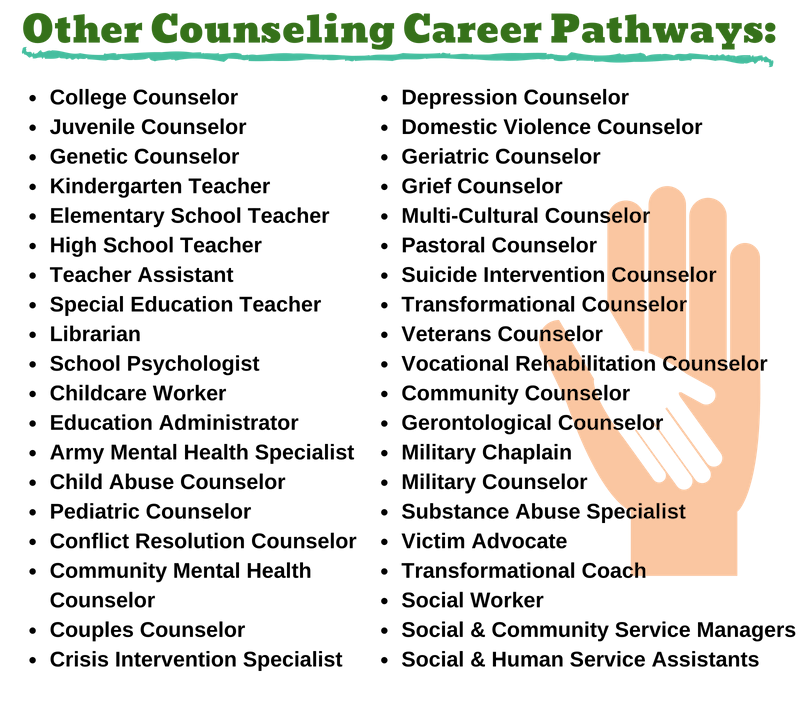Top 10 Most Common Counseling Jobs and Salaries

Find your perfect college degree
Are you curious about the most common counseling jobs available today? Counseling is one of the most fulfilling careers in the industry in terms of taking good care of people’s wellbeing and mental health.
Counselors are professionals who are trained to help people who have specific difficulties in different aspects of their lives, including career difficulties, marital problems, or financial difficulties. They provide stress management plans, new habits, and skills development that help their clients overcome issues and improve their lives.
Everyone encounters problems and stressors in daily life. There are times people solve their problems without someone’s help; however, some people need professional help, especially if it’s too overwhelming or complex to handle on their own.
People sometimes need to seek help in dealing with their struggles – and this is where professional counselors come in.
Interested in a graduate degree in Counseling? 25 MOST AFFORDABLE ONLINE GRADUATE SCHOOLS FOR A MASTER’S IN COUNSELING (MC) and 25 MOST AFFORDABLE GRAD SCHOOLS FOR A MASTER’S IN COUNSELING (MC)
A counseling degree opens up several career opportunities for those people who have the passion and interest in helping other people. A counselor can work in a variety of settings, including healthcare facilities, educational institutions, churches, rehabilitation facilities, or private companies, among many others.
Depending on their preferences, some concentrations will be suitable for everyone in the counseling field. In this list, we summarize the top ten most common counseling occupations.
School Counselor

School Counselors would spend time with students to talk about different issues in their educational lives, including peer pressure, academic performance, family relationships, and career decisions. These people collaborate within the school administration to provide support and foster academic success, personal and social development.
They ensure that students remain prepared and well-adjusted for future endeavors. Generally, the majority of school counselors start their careers with a bachelor’s degree in Counseling, Psychology, or Education. They are encouraged to earn a Master’s degree in School Counseling or Education Psychology.
Licensed Professional Counselor
Licensed Professional Counselors, also known as licensed mental health counselors, work with individuals, families, or groups in a clinical setting. They serve several roles in any member of the society or organization. They address behavioral, emotional, mental, and social difficulties; helping people explore better alternatives to unhealthy ways of dealing with the struggles of daily lives.
Also, licensed professional counselors help people move past trauma, heal addiction, deal with grief and sorrow, discover how to interact with other people, and live their lives to the fullest even with mental challenges. A master’s or doctoral degree is required, as well as the completion of supervised clinical work.
Guidance Counselor
Guidance Counselors provide guidance and support systems to students. They administer and evaluate aptitude tests and other assessments; collaborate with students to identify negative patterns and attitudes and find more positive alternatives; discuss career goals and aspirations, and assist with the ethics and discipline of students. They are employed in primary and secondary academic institutions, while some are found in career centers or job-placement facilities.
Before practicing their profession, prospective candidates must earn a master’s degree in school counseling; however, some organizations allow graduates to provide counseling services without earning a master’s degree. Also, they are required to completing internships or practicums before completing their degrees.
Career Counselor
Career Counselors provide consulting, counseling, and coaching to their clients, helping them explore their strengths and interest. They prepare them for the start, career change, or career advancements. Career counseling can help direct people on the right path when it comes to establishing their professional journeys so that they will be fulfilled and happy with their careers.
They require their clients to take an IQ test, aptitude examinations as well as answering questionnaires regarding their interests and passion. Also, they work in employment and staffing facilities, private companies, and social services offices. The majority of career counselors start their professional journey with bachelor’s degrees.
Marriage and Family Counselor
Marriage and Family Counselors help couples reconnect and improve their lives and their children. They work with different kinds of couples with diverse backgrounds and families to repair their relationships between both parties. They often see similar problems in most couples and families that they encounter.
The goal of marriage and family counselors is not mainly to cease arguments, but to foster an open line of communication between married couples and other family members. As a result, they will learn to discuss issues effectively with the help of these professionals. Marriage and family counselors go into business ventures, or some establish their private firms. Generally, they start their careers with a bachelor’s degree.
Substance Abuse Counselor
Substance Abuse Counselors help people overcome and conquer dependencies on substances that are detrimental to their well-being if abused, such as drugs and alcohol. They work in several organizations and provide professional counseling support and services, focusing on helping people stop drug-seeking behaviors through behavioral and medical treatment programs.
They work with patients, facilitating clinical assessments that identify the course of treatment plans. Substance abuse counselors gather as much information that will be shared with an interdisciplinary team such as doctors, nurses, social workers, or psychiatrists for further assessment and recommendations. To become a substance abuse counselor, earn a master’s degree, and certifications that validate your skill.
Spiritual Counselor
Spiritual Counselors focus on a person’s spiritual side. They guide and provide counseling services to individuals on a variety of aspects – whether spiritual or not. They provide counsel to individuals who have depression and anxiety. Some people need guidance or help in discovering their spiritual or religious beliefs. This is where the help of a spiritual counselor comes in.
Spiritual counselors help people reach a state of awareness or self-realization. Also, they let people realize how interconnected they are with the rest of the universe. The majority of spiritual counselors work in places of worship or other religious organizations.
Life Coach
Life Coaches provide help to people in changing their lives. They help clients rethink their choices, providing more fulfilling ventures. They create solutions, assisting patients in resolving their issues that are hindering them from achieving success and happiness. Life coaches guide patients toward greater fulfillment and control of their own lives.
Patients learn the art of listening to their hearts, gain a greater appreciation for their capabilities, and boost their self-esteem or self-confidence. Life coaches must have a passion for serving their clients, understanding that their clients’ achievements are also their success. They must have excellent communication skills and empathy.
Rehabilitation Counselor
Rehabilitation Counselors treat patients with emotional, mental, physical, or social issues so that they can regain their power and live as independently as possible. They facilitate every disabling situation and work with all types of disability such as disabilities caused by war, behavioral and emotional disabilities, or those health-related disabilities such as muscular dystrophy and cerebral palsy.
They are mental health professionals who work with disabled people to develop skills, overcome feelings of anxiety and depression, and find resolutions to problems such as mobility, employment, transportation, and chronic pain, among others. Rehabilitation counselors often find work in physical therapy clinics, nursing homes, traditional hospitals, and assisted living institutions.
Mental Health Counselor
Mental Health Counselors work mostly with individual clients, families, or groups of people based on mental health issues and treatment programs. They provide help to individuals who suffer from anxieties, depression, addiction, grief, or low self-esteem.
They are trained to deal with people holistically, treating the person as a whole – body, mind, and spirit. Mental health counselors understand the role of personalities and traits and how these factors help or hinder conditions such as anxiety and depression. These people enjoy working with people as well as having a passion for guiding them in creating positive changes in their lives.
Other Counseling Occupations
Indeed, the counseling profession is a rewarding and vast field to venture into; thus, there are numerous professional opportunities suitable for everyone’s passion and aspirations. It is an excellent option for people who have the heart and passion for helping others live their lives, creating a positive impact on them. If you are interested to know about other counseling-related professions, we have listed other occupations that might spark your interest.





